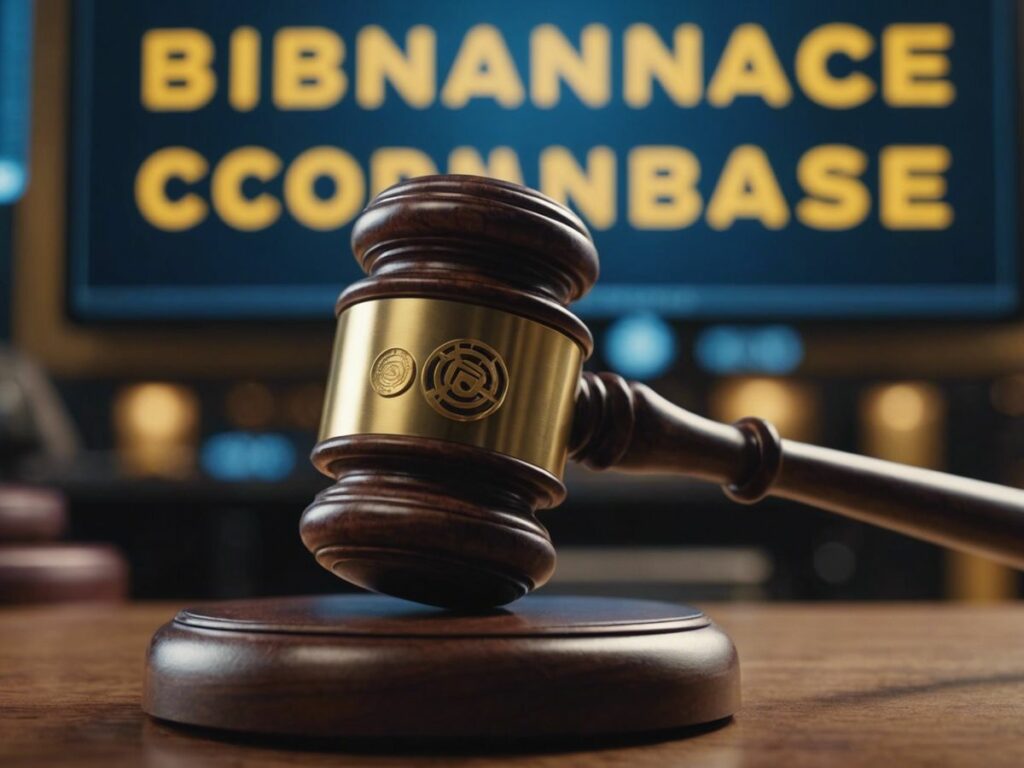In 2023, the U.S. Securities and Exchange Commission (SEC) initiated lawsuits against the world’s three largest crypto exchanges – Binance, Coinbase, and Kraken – signaling a new era for the previously unrestrained crypto industry.
Key Takeaways
- The SEC has filed lawsuits against Binance, Coinbase, and Kraken for operating as unregistered securities exchanges.
- Binance faces the most severe allegations, including misuse of customer funds.
- The lawsuits are expected to extend into 2024, with significant market reactions and regulatory implications.
SEC vs. Binance: Accused of Using Customer Funds
On June 5, 2023, the SEC filed a lawsuit against Binance, accusing the exchange of several violations:
- Running an unregistered exchange and allowing U.S. investors to trade cryptocurrencies.
- Selling Binance-owned cryptos BNB and BUSD stablecoin.
- Offering staking and profit-generating programs like BNB Vault and Simple Earn.
- Misrepresenting investor protection controls on the Binance.US platform.
- Not allowing Binance.US to operate independently.
- Concealing efforts to ensure high-value U.S. investors continued trading on Binance.com.
- Using customer’s crypto and fiat assets.
- Engaging in wash trading to inflate trading volume on Binance.US.
The SEC’s allegations against Binance are particularly severe, drawing parallels to the now-defunct FTX exchange. As of late November 2023, the lawsuit remains unresolved, with Binance filing a motion to dismiss the case. The exchange has agreed to pay a $4.3 billion fine to settle charges from the Department of Justice (DoJ), Commodity Futures Trading Commission (CFTC), and Financial Crimes Enforcement Network (FinCEN). This settlement led to the resignation of Binance CEO Changpeng Zhao, with Richard Teng stepping in as the new CEO.
SEC vs. Kraken: Complaints of ‘Commingling’ Filed
On November 20, 2023, the SEC filed a complaint against Kraken, accusing the exchange of operating as an unregistered securities exchange, broker, dealer, and clearing agency. The SEC also alleged that Kraken commingled customer funds for operating expenses, despite auditor warnings. Kraken has denied the charges and intends to defend itself in court. This is not the first time Kraken has faced SEC action; in February 2023, the exchange agreed to cease its crypto staking services and pay $30 million in fines.
SEC vs. Coinbase: “Compliant” Exchange Accused of Non-Compliance
A day after the Binance lawsuit, the SEC charged Coinbase with operating as an unregistered securities exchange, broker, and clearing agency. The SEC also took issue with Coinbase’s staking-as-a-service program and its marketing campaigns. Coinbase has responded by attempting to register parts of its business with the SEC, but claims the regulator has been uncooperative. The lawsuit is expected to extend into 2024.
Crypto Market Reactions to SEC vs. Exchanges
Despite the lawsuits, the cryptocurrency market has shown resilience. Bitcoin (BTC) and Ether (ETH) quickly rebounded from initial sell-offs. However, cryptocurrencies identified as securities by the SEC, such as BNB, ADA, SOL, MATIC, and ATOM, experienced selling pressure. Binance saw significant withdrawals, with users pulling out over $3 billion within 24 hours of the lawsuit announcement. Coinbase’s stock initially dropped but has since recovered, posting year-to-date gains of over 250% as of late November 2023.
What Next for the Crypto Industry?
Compliant CEX as a Crypto On-Ramp
Experts predict that U.S. crypto companies may move offshore as regulations tighten. Centralized exchanges (CEX) in the U.S. might only list Bitcoin and Ether, while international exchanges could list other tokens. Coinbase’s BASE product is an example of how exchanges might adapt by offering decentralized exchange (DEX) services.
CFTC Over SEC
The crypto industry prefers regulation by the CFTC rather than the SEC. Industry insiders are lobbying for cryptocurrencies to be classified as commodities, which would allow for less stringent regulatory requirements. CFTC Chair Rostin Behnam has indicated that implementing cryptocurrency regulations could take one to two years.
Understanding the SEC’s Concerns
The SEC aims to regulate cryptocurrencies similarly to the stock market, ensuring that crypto companies provide truthful information and protect investors. The regulator’s actions against Binance, Coinbase, and Kraken are part of this broader effort.
The Bottom Line: Crypto Regulations Are Inevitable
Cryptocurrency regulation is inevitable, but there is hope that the U.S. will offer a fair regulatory environment. With clearer regulations, crypto exchanges are expected to become stronger, safer, and more acceptable.
What Is the U.S. SEC?
The U.S. SEC was established in 1934 to restore public confidence in the stock market after the 1929 crash. The regulator ensures that listed companies provide truthful information and regulates brokers, dealers, and exchanges.
What Is Binance?
Binance is the world’s largest crypto exchange, founded by Changpeng Zhao. It operates as Binance.US in the U.S. and has its own cryptocurrency, BNB.
What Is Coinbase?
Coinbase, founded in 2012 by Brian Armstrong, is the largest crypto exchange in the U.S. by trade volume. The company is launching a blockchain network called Base in collaboration with Ethereum layer-two network Optimism.
What Is Kraken?
Kraken, co-founded in 2011 by Jesse Powell and Thanh Luu, is one of the oldest crypto exchanges. It offers services in over 190 countries and supports transactions in eight fiat currencies.
